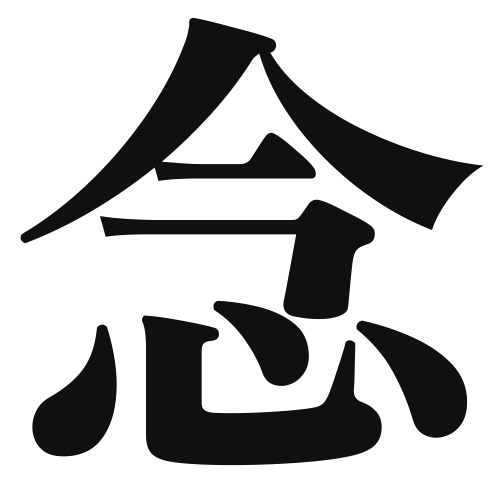1. Overview of Meaning
The kanji “念” (nen) primarily means “thought,” “idea,” or “mind.” It conveys the concept of mental focus or consideration, often associated with feelings or intentions.
2. Formation and Radical
Formation of the Kanji: The kanji “念” is a phonetic-ideographic character (形声文字). It combines the radical for “heart” (心) at the bottom, indicating its connection to emotions and thoughts, with the phonetic component “年” (nen), which contributes to its pronunciation.
Radical: The radical of “念” is 心 (shin), which relates to the heart or mind, emphasizing its emotional and mental aspects.
3. Examples of Usage
Common Words and Phrases: Some frequently used words that include “念” are:
- 念願 (ねんがん, nengan) – a long-cherished desire
- 念頭 (ねんとう, nentou) – in one’s mind, consideration
- 念仏 (ねんぶつ, nenbutsu) – chanting of the Buddha’s name
Example Sentences in Daily Conversation:
- 彼の念願は世界一周旅行です。
(His long-cherished desire is to travel around the world.) - そのことを念頭に置いておいてください。
(Please keep that in mind.)
4. Synonyms and Antonyms
Similar Kanji: A similar kanji is “思” (omo), which means “to think” or “thought.” While both relate to mental processes, “念” often implies a deeper emotional connection or intention.
Opposite Kanji: An antonym could be “忘” (wasure), which means “to forget.” This represents the absence of thought or consideration.
5. Cultural and Historical Background
Connection to Japanese Culture: The concept of “念” is significant in various aspects of Japanese culture, particularly in Buddhism, where it relates to mindfulness and meditation.
Proverbs and Idioms: One common saying is “念には念を入れよ” (nen ni wa nen o irey), which translates to “Take care to be careful,” emphasizing the importance of thorough consideration and thoughtfulness in actions.
